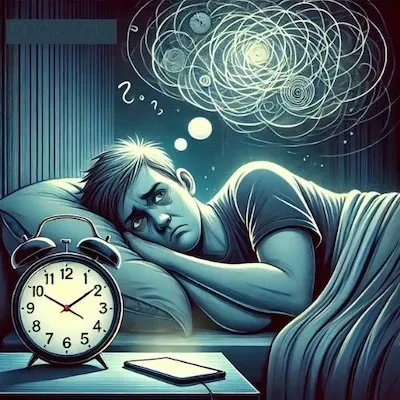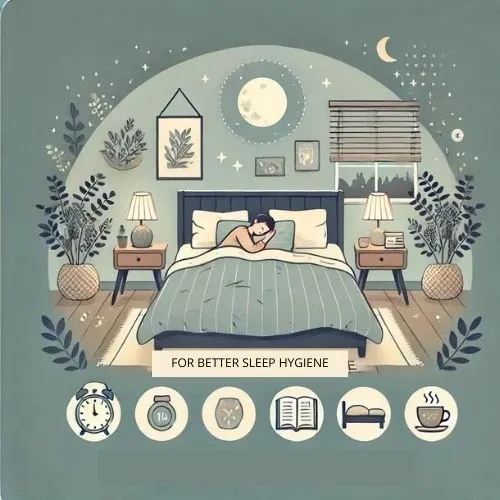5 Proven Strategies for Falling Asleep Faster - A Guide to Better Rest
By Mehboob Ali Nazarani, M.D.
Published July 26, 2024 · Last reviewed July 26, 2024 · 2 min read
Introduction
A good night's sleep is crucial for health and well-being, yet many people struggle to fall asleep quickly. Tossing and turning with racing thoughts can be frustrating, but there are effective strategies to combat this. This article presents five practical techniques to help you fall asleep faster, ensuring a more restful and rejuvenating night.
The Importance of Sleep
Quality sleep is essential for physical and mental health. It aids in healing, cognitive function, and emotional well-being. However, factors like stress, lifestyle, and environment often disrupt our ability to fall asleep promptly. Employing specific strategies can significantly improve sleep onset.
Strategy 1: Progressive Muscle Relaxation
Progressive Muscle Relaxation (PMR) involves tensing and then relaxing different muscle groups in your body. This technique:
- Reduces physical tension and mental anxiety.
- Involves systematically going through each muscle group.
- Can be done in bed as part of your nightly routine.
Strategy 2: Controlled Breathing Exercises
Controlled breathing, such as the 4-7-8 technique, can help calm the mind:
- Breathe in for 4 seconds, hold for 7 seconds, and exhale for 8 seconds.
- Helps shift focus away from anxious or stressful thoughts.
- Can be combined with visualization for enhanced relaxation.
Strategy 3: Establishing a Bedtime Routine
A consistent bedtime routine signals your body it's time to wind down:
- Include calming activities like reading or a warm bath.
- Avoid screens at least an hour before bed.
- Ensure the sleeping environment is conducive to rest (cool, dark, and quiet).
Strategy 4: Mindfulness and Meditation
Mindfulness meditation focuses on the present, helping to alleviate bedtime anxiety:
- Practice focusing on your breath or bodily sensations.
- Use guided meditation apps designed for sleep.
- Even a short session can prepare the mind for sleep.
Strategy 5: Limiting Stimulants and Heavy Meals
Diet and substance intake significantly impact sleep quality:
- Avoid caffeine and nicotine close to bedtime.
- Steer clear of heavy, rich foods that might cause discomfort.
- Consider a light, healthy snack if you're slightly hungry at bedtime.
Conclusion
Falling asleep quickly is a skill that can be learned and improved. By incorporating strategies like progressive muscle relaxation, controlled breathing, and establishing a consistent bedtime routine, you can enhance your sleep quality. Remember, if sleep difficulties persist, it may be beneficial to seek advice from a healthcare professional. For more health and wellness tips, explore our website further.
References/Further Reading:
- Harvard Medical School's Division of Sleep Medicine
- National Sleep Foundation website for additional resources and information.
This article is part of our approach to whole-person psychiatric care. If this resonates with your experience, our team is here to help.

Mehboob Ali Nazarani, M.D.
Board-Certified Psychiatrist
Mehboob Ali Nazarani, M.D.
View full profile →Related Articles
 Sleep
SleepMehboob Ali Nazarani, M.D. · Mar 13, 2025 · 10 min read
The Causes of Poor Sleep and Insomnia - Why You Can't Sleep at Night
Struggling with sleepless nights? Discover the most common causes of poor sleep and insomnia, from bad sleep habits and stress to medical conditions and mental health factors. Learn why you can't sleep and what to do next.
Read article Sleep
SleepMehboob Ali Nazarani, M.D. · Mar 10, 2025 · 8 min read
10 Tips for Better Sleep Hygiene: Improve Your Sleep Naturally
Struggling to get quality sleep? Discover 10 science-backed tips to improve your sleep hygiene, from optimizing your bedroom environment to managing stress and reducing screen time. Sleep better, naturally.
Read article Sleep
SleepMehboob Ali Nazarani, M.D. · Jun 28, 2024 · 2 min read
Improving Your Sleep Hygiene for Better Rest
Learn key strategies for enhancing your sleep hygiene in this concise guide. Discover practical tips for a restful night and overall health improvement.
Read article